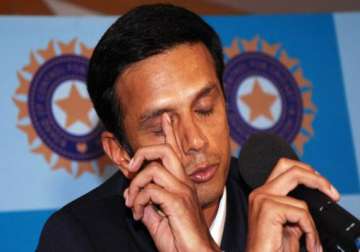New Delhi, Aug 8: Effective law enforcement is the key to controlling spot-fixing, former India captain Rahul Dravid said in an interview published Wednesday.
“I don't think only education can work, (we have to) police it and have the right laws and ensure that people, when they indulge in these kind of activities are actually punished,” Dravid told the Crincinfo website.
Dravid is the captain of the Rajasthan Royals team, three of whose players—test cricketer Shantakumaran Sreesanth, Ajit Chandila and Ankeet Chavan—were arrested for allegedly spot-fixing during this year's Indian Premier League and are now out on bail.
Two team officials, Chennai Super Kings team principal Gurunath Meiyappan and Rajasthan Royals co-owner Raj Kundra, have also faced investigations. Meiyappan spent nearly two weeks in jail after he was accused of spot-fixing, while Kundra admitted only to betting and was never arrested.
“In some ways it's only the police who can do that (investigate cases), because they are the only ones who have the power,” Dravid said. “For example, the only way you can prove this is if you secretly tape people, if you follow people, and I don't think any administrator (could); we would never give that power to administrators of any sporting body in our country and we shouldn't.”
Sreesanth, Chandila and Chavan were arrested by Delhi police, who said they had proof that the three conceded a fixed minimum number of runs per over in exchange for up to 6 million rupees ($100,000) from illegal bookmakers for every over.
The BCCI's own investigation cleared Meiyappan and Kundra of any wrongdoing but the Bombay High Court termed the panel named for the probe as “illegal and unconstitutional” according to the cricket board's rules. The matter is now in the Supreme Court, which refused to give an interim stay to the BCCI, but agreed to listen to the case.
The BCCI has also launched a separate probe into the role of players in the spot-fixing scandal.
The 40-year-old Dravid is counted among the best modern-day batsmen, scoring 13,288 runs in 164 test matches and 10,889 in 344 one-day internationals.
He said spot-fixing is hard to control “because if someone decides tomorrow to get out or an individual decides to bowl a no-ball or a wide or give a certain number of runs an over, there's very little you can do and very little somebody else can do around it.”
Dravid, who retired from international cricket last year, said administrators need to worry about the credibility of the game.
“Administrators are there because of the fans and the cricketers, to run this game,” Dravid said. “So I think that credibility of game in the eyes of the public is extremely important.”
